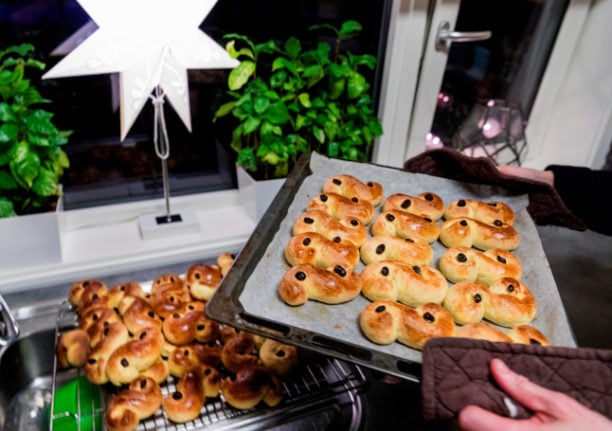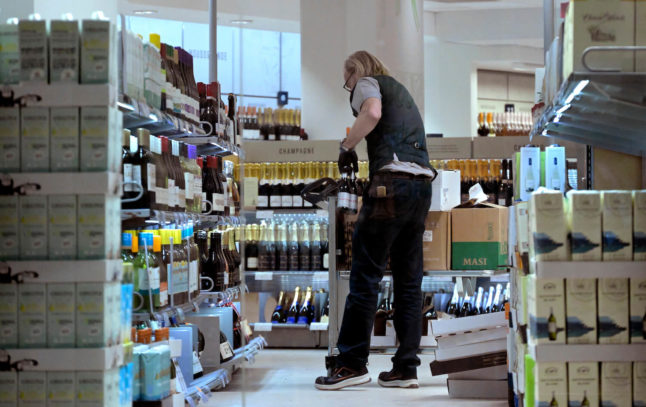This survey is now closed. Thanks to everyone who responded; you can see the article we wrote based on the responses here. If you would like to get in touch to share your questions or experiences about life in Sweden, you are always welcome to contact us at [email protected].
WINTER
Tell us: How are you making it through Sweden’s winter darkness?
Get together with lots of friends? Not a good idea. Make a trip to sunnier climes? Nope. But what can we do even during a pandemic to make Sweden's most unforgiving months of the year just a little, little bit easier to bear?

For members
BUSINESS
Does a new court ruling spell the end of Sweden’s alcohol monopoly?
Sweden's Supreme Court ruled has ruled that an online wine retailer based in Denmark could continue to market and sell its wines to customers in Sweden. So is this "the beginning of the end" for Sweden's alcohol monopoly as some suggest?

What’s happened?
Sweden’s Supreme Court on Friday ruled in favour of the online wine retailer Winefinder in its long-running case against Systembolaget, Sweden’s state-owned alcohol monopoly, which had tried to stop the company from marketing and delivering to customers in Sweden.
The court ruled that Winefinder’s business was permissible under Sweden’s alcohol and marketing laws, because although the company has a Swedish holding company, the company making the sales is registered in Denmark, operated from Denmark, and uses independent couriers to deliver to customers in Sweden.
“According to the Supreme Court, the inquiry showed that it was the Danish company that sold wine to consumers in Sweden through e-commerce,” the court said in a press release.
“The Danish company was established in Denmark and the wine was delivered to Sweden by a courier hired by the Danish company. The Danish company purchased services regarding, for example, finance, IT and customer service from the Swedish parent company, but the inquiry did not show that any sales activity had taken place on site in Sweden.”
The court ruled that this meant that from the perspective of the law, private Swedish consumers were themselves importing wine from a retailer based in Denmark, meaning Systembolaget’s monopoly on retail sales of alcohol had not been contravened.
READ ALSO: Why Swedes love and hate state-owned alcohol monopoly ‘Systemet’
What’s the background?
Systembolaget took Winefinder to court back in 2019, seeking to ban it from selling wines via its Swedish online retail site, and in 2020 it won its case, with Sweden’s patent and marketing court ruling that Winefinder’s business broke Sweden’s alcohol laws.
Winefinder then successfully appealed the ruling, with the patenting and marketing appeals court ruling in 2022 that its business was legal and it could continue selling wine to Swedish consumers (which it had never stopped doing anyway).
Systembolaget was established back in 1955, combining all the regional alcohol monopolies which had been in place in Sweden under the previous rationing system. It was given an exemption from European antimonopoly and free trade rules when Sweden joined the EU in 1995.
What will it mean?
The Supreme Court has the last word on legal cases in Sweden, so from now on Winefinder and other online retailers based elsewhere in the EU can market to, and export to Swedish customers without any legal ambiguity.
Alex Tengvall, Winefinder’s Stockholm-based Swedish chief-executive, predicted that this would bring bigger competitors.
“I believe that this will open the door for larger players, and that people will now dare to invest,” he told Svenska Dagbladet.
Benjamin Dousa, CEO of the right-wing think tank Timbro, said he believed that the verdict would eventually see Systembolaget’s monopoly undermined as more and more Swedes opt for the broader and often cheaper selection of wines offered by overseas online retailers.
“This is the beginning of the end for Systembolaget. We probably won’t have a monopoly in 10-15 years as a direct result of today’s announcement,” he said in a written comment to the Svenska Dagbladet newspaper.
This court case is not the only threat to the monopoly.
In the Tidö Agreement between the three government parties and the far-right Sweden Democrats, the government committed to holding an inquiry into allowing Swedish vineyards and other local alcohol producers to sell their drinks to consumers.
Does this mean the end of Sweden’s alcohol monopoly?
Don’t bet on it.
In its verdict, the court clearly states that Systembolaget retains the sole right to carry out retail sales of drinks which contain more than 3.5 percent alcohol, but that under law this right is limited to sales which actually take place physically in Sweden, or, when it comes to online sales, between a company based in Sweden and consumers in Sweden.
The verdict does not mean it will be possible to buy wine in supermarkets, as you can in France, Germany or the UK, or that private off licenses or bottle shops will spring up across Sweden.
It also won’t bring an end to the frustration many in Sweden feel at being unable to buy alcohol on public holidays or ‘red days’, or between the time Systembolaget closes at 3pm on Saturday and its next opening at 10am on Monday. Winefinder typically takes at least two days to make a delivery. to Sweden.
What happens next?
As soon as the verdict was out, the opposition Social Democrats were calling for Sweden’s alcohol law to be changed to close the loophole Winefnder has been using.
“We had hoped before that this would not be the outcome, but now that we can see how the Swedish legislation works and the consequences of this, we have to review it and plug the holes,” the party’s group leader in the Swedish parliament, Lena Hallengren, said.
An internal report from Sweden’s Ministry of Social Affairs has also called for new regulations to be brought in to prevent overseas retailers threatening Systembolaget’s position.
“The ministry has stated several times that it is an urgent issue that needs to be regulated more clearly,” the document, obtained by Svenska Dagbladet reads. “Clearer rules on distance trading are an important step towards continuing to protect the monopoly.”
Sweden’s Social Affairs Minister, Jakob Forssmed, who is responsible for the monopoly on Friday would not say whether or not he planned to tighten the rules.
“The retail monopoly is an important part of Swedish alcohol policy, which must be protected. We will analyze the current judgment, what consequences it may have and what possible measures it may lead to,” he told Svenska Dagbladet.
It is highly possible that rather than opening up and legalising Winefinder’s business, the verdict will ultimately lead to politicians closing it down.

 Please whitelist us to continue reading.
Please whitelist us to continue reading.
Member comments